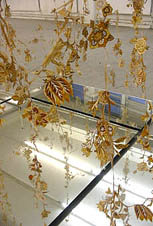Arboreal
dal 4/5/2007 al 2/6/2007
Segnalato da
4/5/2007
Arboreal
Transition Gallery, London
Tobi Deeson, Debbie Lawson, Lee Maelzer and Jo Wilmot. The show explores man's interaction with the contemporary world, looking at humdrum consumerism, perceived social status, abuse and relationships in our apocalyptic times.

Tobi Deeson, Debbie Lawson, Lee Maelzer and Jo Wilmot
Arboreal explores man’s interaction with the contemporary world,
looking at humdrum consumerism, perceived social status, abuse and
relationships in our apocalyptic times. Humans are absent, their
presence embossed through the use of structures, materials and the
juxtaposition of the organic and synthetic.
Arboreal is not only concerned with the physicality and strength of
the organic form but also how it can represent a deconstruction of
the mind, a direct contrast when laid next to the formalities of the
manmade world. A battle can begin.
Tobi Deeson plays on the promise of nature, presenting delicate
flowers which on closer inspection are fake; mass produced from cheap
bed sheets. Clearly referencing family history and personal
relationships but avoiding sentimentality and narcissism, his work
instead evokes a cultural memory in a bed sheet, and a reminder that
it is the shared personal and practical details of everyday life
lived, in which social life, change and personal endurance are found.
Debbie Lawson uses cheap wooden panels, which she treats with the
utmost respect. Working with the wood’s natural beauty she carves
and inlays fabrics and stained wood, giving the pieces a new lease of
life. Often using wolves as protagonists, her panels resemble
episodes in a picaresque tale exploring the psychological landscape
of the domestic interior.
Lee Maelzer’s paintings explore contrasting representations of the
apocalyptic sublime and the ordinary. They are filled with portent;
describing with a certain amount of tenderness the fine line between
everyday life and the end of the world.
Jo Wilmot’s practice is concerned with the failure of perceived
luxury to create paradise. Her dystopian paintings refer to the
failure of expectation and explore the idea of fractured pleasure. In
such environments architecture is used as a starting point for
controlling emotions. Packed full of painterly devices, including
drips and smears, the works are unsettling and claustrophobic.
Transition Gallery
Unit 25a Regent Studios, 8 Andrews Road - London
Opening times: Fri – Sun 12-6pm



